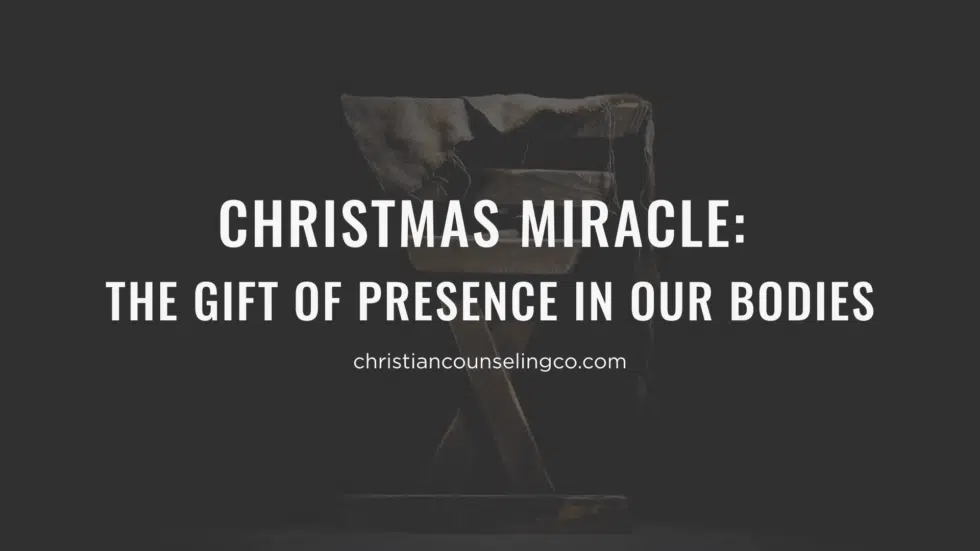I remember writing a prayer in my journal years ago in the midst of an awe-inspired Christmas season. It read, “Help me experience the miracles of Christmas every day.” The feelings of awe, of surprise, of wonder at the beautiful, twinkling lights, of anticipation–how wonderful if I could experience that every day, not just at Christmas time. But now I find myself wondering…what does it mean to experience the miracles of Christmas?
The term Christmas is derived from the Old English words Crīstes mæsse, meaning “Mass of Christ.” We feast because the anointed one has come to bring salvation. We feast with our physical bodies as we celebrate Christ’s embodiment. Emmanuel. God is with us. God enveloped in soft, new flesh. God with heart, lungs, bones, and muscles. God like us.
How do we experience the miracles of Christmas? We draw into our bodies. Creatures enveloped in flesh, with heart, lungs, bones, and muscles. Like Christ. Our bodies are our vessels through which we engage the world–from first cry to final breath–like Christ. It was through a woman’s body that Christ was brought into the world, by a woman’s arms, Christ was held and nurtured, and by a woman’s body Christ was fed and sustained. Isn’t it interesting that our bodies are vessels for so many miracles, but often treated as the targets of our deepest discontent?
For many, our bodies have become a source of fear, shame, disappointment, and suffering.
Our bodies have been abused, misused, overtaken by chronic pain and illness, told they are “not enough” or “too much,” irreversibly altered from birth or by life circumstances. These vessels we live in have brought us unbearable pain, and yet, they are our earthly “homes.” What if the messages our bodies are sending to us, even in suffering, carry with them the compassion of God and an invitation into fullness of life?
What if the salvation Emmanuel offers includes an invitation inward, where Christ left us his great gift – Holy Spirit, God in us. What if every day we are offered the gift of God’s presence with us as we practice presence through our bodies?
“Be still and know that I am God.” (Pslam 46:10)
Our breath is a constant reminder of the life God breathes into us. Breath is an act of prayer, of praise, of worship. What if we really noticed it? Miraculous!
What if we actively notice the physical longings of our bodies–the swelling of our chests, the pulling of our cores, the sinking of our stomachs–and let our physical sensations draw us into more presence with ourselves, translating into presence with others and ultimately, with God. It is in the moments of stillness that we can awaken to the miracles available to us in each moment. “Be still and know that I am God.” What a miracle it is to know in our flesh, hearts, lungs, and down to our very bones, that God is God.
Isn’t it a miracle that your heart keeps beating? Be still and notice.
Isn’t it a miracle that your skin encases you, a natural boundary and protection of your vital organs, holding you together, as it helps you navigate your environment, sending you warmth as you hold another human hand? Be still and notice.
Isn’t it a miracle that the brain God crafted for you mimics redemption in its ability to make new pathways for thinking and being in the world? Be still and notice.
What other miracles might you notice if you risked being embodied, if you risked being still, if you risked knowing that God is God and you are created with flesh, with heart, lungs, bones, and muscles, like Christ?
Author: Kendra Hill
Kendra Hill is an amazing Christian counselor on our team here in Colorado. She meets with individuals and couples in-person and online, and specifically loves to work with highly-sensitive people, those in the process of healing from Church Hurt, and those working through trauma or abuse.
If you’re interested in counseling with Kendra or another one of our other amazing counselors, click here to view our line-up.







